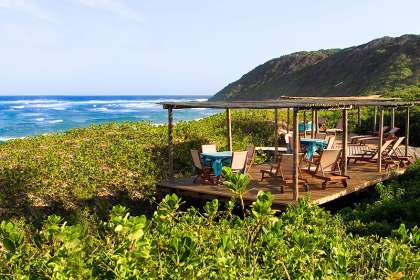Lake Sibaya
Lake Sibaya
Lake Sibaya falls within the Isimangaliso Wetland Park, and covers a total
surface area of seventy square kilometers, making it the second largest
freshwater lake in South Africa. The lake features one hundred kilometers of
untouched shoreline, and its diverse plant species provide a variety of habitats
for birds, mammals and marine life. Research has concluded that centuries ago
the lake was once joined to the sea and with the natural closure of the estuary,
numerous species of fish and aquatic creatures were trapped in a fresh water
environment.
Vegetation growing at the lake are typical examples of coastal dune forest
varieties. The presence of an orchid called Vanilla Roscheri is of particular
importance is, as the rare plant grows nowhere else other than at Lake Sibaya.
Another orchid, Oecevelades decaryanum, was collected at the Lake for the first
time in South Africa and an unknown Oecevelades sp. occurs near Sibaya.
Lake Sibaya is also home to the second largest population of hippopotamus and
crocodile in the province of KwaZulu-Natal and serves as an important breeding,
roosting and feeding habitat for a wide variety of bird species. Surface water
in the surrounding coastal plain often evaporates completely during the warmer
times of the year, leaving the lake as the only permanent source of water for
birds and mammals.
Lake Sibaya and the streams which feed it, support about eighteen various
species of fish. A freshwater goby, scientifically known as Silhouetta sibayi,
is almost endemic to this water system, as it is very rarely found elsewhere.
There are also an impressive total of twenty two species of frog known to
inhabit Lake Sibaya, of which twenty are tropical species. More common species
found at the lake include Grass Frogs, Reed Frogs and toads. Larger reptiles
found here include African Python, Forest Cobra, Water Monitor and Nile
Crocodile.
There are six species of mammal which mainly frequent the area around the Lake,
namely hippopotamus, reedbuck, vlei otomys and African marsh rat, and white
tailed and water mongoose. Other mammals occasionally found in the area include
tona red squirrel, four toed elephant shrew, suni, samango monkey, and both red
duiker and blue duiker.
Lake Sibaya is literally a birdwatcher's mecca with an estimated total of about
two hundred and seventy nine species recorded at the Lake alone. The water
system is environmentally important for breeding, roosting and feeding habits.
The most sighted species at the lake are Pied, Giant and Malachite Kingfishers;
Red and White Breasted Cormorants; Fish Eagles and a variety of herons, egrets
and darters. Waders include the Black Winged Stilt, Avocent, Greenshank, White
Fronted Sand Plover, and Spoonbills. The sheltered bays along Lake Sibaya are
home to jacana, crakes, gallinules and bitterns. Also recorded at the lake are
the rare Palmnut Vulture, Pel's Fishing Owl, Pygmy Goose, flamingoes, Woodward's
Batis and Rufousbellied Heron.
Accommodation Near Lake Sibaya
Thonga Beach Lodge
Holiday Resort Accommodation in Mabibi, Lake Sibaya
2.2km from Lake SibayaThis intimate, luxury 12 suite lodge is nestled on the pristine coast of Maputaland, Northern KwaZulu-Natal, within the Isimangaliso Wetland Park - an internationally recognized World Heritage Site. It's the ideal place to explore unspoilt, ... …see more for bookings / enquiries and info.
Toad Tree Cabins
Self Catering House, Cottage, Chalet Accommodation in Sodwana Bay
20.8km from Lake SibayaSodwana Bay, the unspoilt jewel of African Coast boasting golden beaches, fertile swamp forests, lakes, extensive river estuaries and coral reefs teaming with fish life. …see more for bookings / enquiries and info.
 Lake Sibaya- Zululand & Maputaland, KwaZulu-Natal ©
Lake Sibaya- Zululand & Maputaland, KwaZulu-Natal © 



